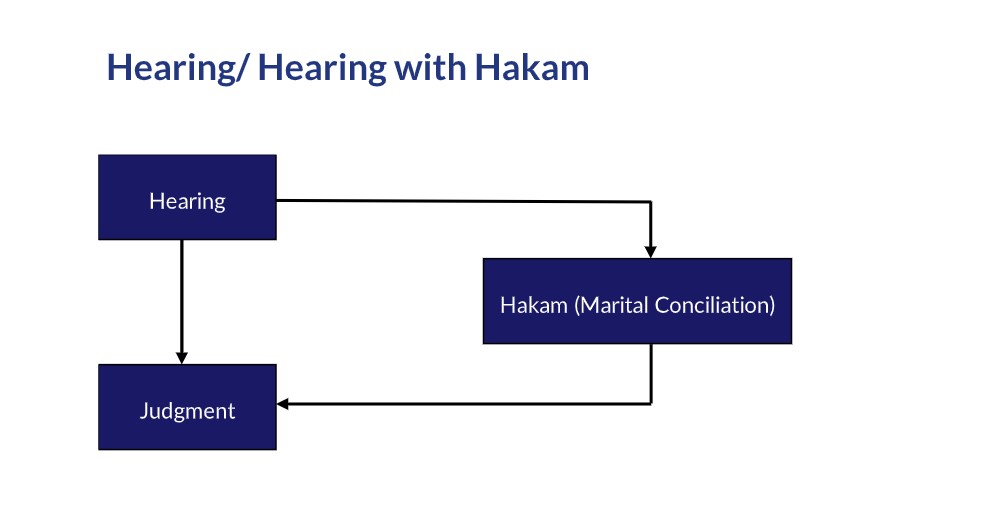Hearing/ Hearing with Hakam
Hearing/ Hearing with Hakam

Process
At the Hearing, the Court will decide on your divorce case based on the evidence that you have submitted in your affidavits. In some cases, the Court may require 2 adult male Muslims witnesses (or its equivalent) to give evidence for your case.
Where the issue of divorce is contested between the parties, the Court may order the appointment of hakam (one for each party) from the SYC Panel of Hakam (Marital Conciliators) to resolve the marital dispute. The hakam will endeavour to effect reconciliation where possible, or to facilitate an amicable divorce if reconciliation is not possible. Following the order appointing hakam, parties will have to pay $150 each for the hakam fee, and $22 for the Order of Court. To provide the hakam with full authority, including to pronounce a divorce, you and your spouse will each have to sign an authorisation form. Please note that even if the hakam are unable to obtain such authority from you, the hakam may still pronounce a divorce if they are of the joint opinion that the parties should be divorced.
After the hakam session, the hakam will provide a report to the Court on the outcome of the hakam session, including whether they are of the joint opinion that the parties should be divorced.
The SYC Panel of Hakam (Marital Conciliators) consist of asatizah accredited under Muis’ Asatizah Recognition Scheme with a background in Muslim law or experience in helping Muslim families. The list of hakam who are on SYC’s Panel of Hakam (Marital Conciliators) can be found here.
Ancillary matters
At the hearing, the Court will also decide on matters ancillary to the divorce, where applicable. The ancillary matters are: the custody, care and control of, and access to children, nafkah iddah, mutaah (consolatory gift), hantaran belanja (marriage expenses), emas kahwin (obligatory marriage payment due under the Muslim law by the husband to the wife at the time the marriage is solemnised), and disposition or division of property.
If there is a dispute on custody, care and control of and access to your child, and the child is aged between 7 and 21 years old, the Court may direct for your child to attend a Joint Child Interview (JCI) before the President and a court counsellor to ascertain your child’s preferences, wishes and concerns. The JCI is confidential.
The Court may also avail itself of other judicial tools such as the calling of a Custody Evaluation Report (CER). A CER is prepared by an appointed agency where there are, amongst other things, serious disputes or allegations impacting the orders which may be made on custody, care and control of, and access to the child/children. The appointed agency will interview you, your spouse, your child and any other significant adults in your child’s life. The report submitted to the Syariah Court is confidential. There are no fees required for the CER. Referral for the CER is strictly by court orders only.
Court Documents Issued Post Divorce
Decree – A Decree of Divorce is made by the Court upon the dissolution of marriage between parties. This document may also contain other Orders made by the Court in respect of the parties.
Divorce Certificate –
A Certificate of Divorce evidences a record of divorce between parties in the Court’s Register of Divorces. The Certificate of Divorce will be available for download in the SYC Portal in the ‘Court File’ under the :
- 'Court Orders' (for the cases where the divorce was registered before 18 November 2022) OR
- 'Court Documents' (for cases where the divorce was registered after 1 December 2022) section,
after the administrative period applicable in your case.
If you are represented by a lawyer in the divorce proceedings, the Certificate of Divorce will be available for download in the SYC Portal to your lawyer. The general guidelines on the applicable administrative periods are found in the table below.
|
Type of divorce |
Administrative period for issuance of Certificate of Divorce |
|
Where the Court confirms a husband’s pronouncement of talak and the wife’s iddah period has not expired on the date the Decree was made.
|
An administrative period of 3 months and 10 days from the date the Decree was made (irrespective of whether the iddah period will end before that point of time).An administrative period of 3 months and 10 days from the date the Decree was made (irrespective of whether the iddah period will end before that point of time). This administrative period also applies to reconciliation (rujuk) cases. Parties may use their Decree of divorce for their revocation of divorce application at the Registry of Muslim Marriages.
|
|
Where the Court confirms a husband’s pronouncement of talak and the wife’s iddah period has expired on the date the Decree was made. |
Within 7 working days from the date the Decree was made. This administrative period also applies to reconciliation (remarriage) cases.
|
|
When the Court has decreed a divorce by talak ba’in sughra, talak ba’in kubra and fasakh. |
Within 7 working days from the date the Decree was made. |
Order of Court – An Order of Court may be issued as part of a Decree of Divorce or as a separate document. It contains Orders made by the Court in respect of the parties, whether upon divorce, during the pendency of the divorce proceedings, or subsequent to the divorce.
